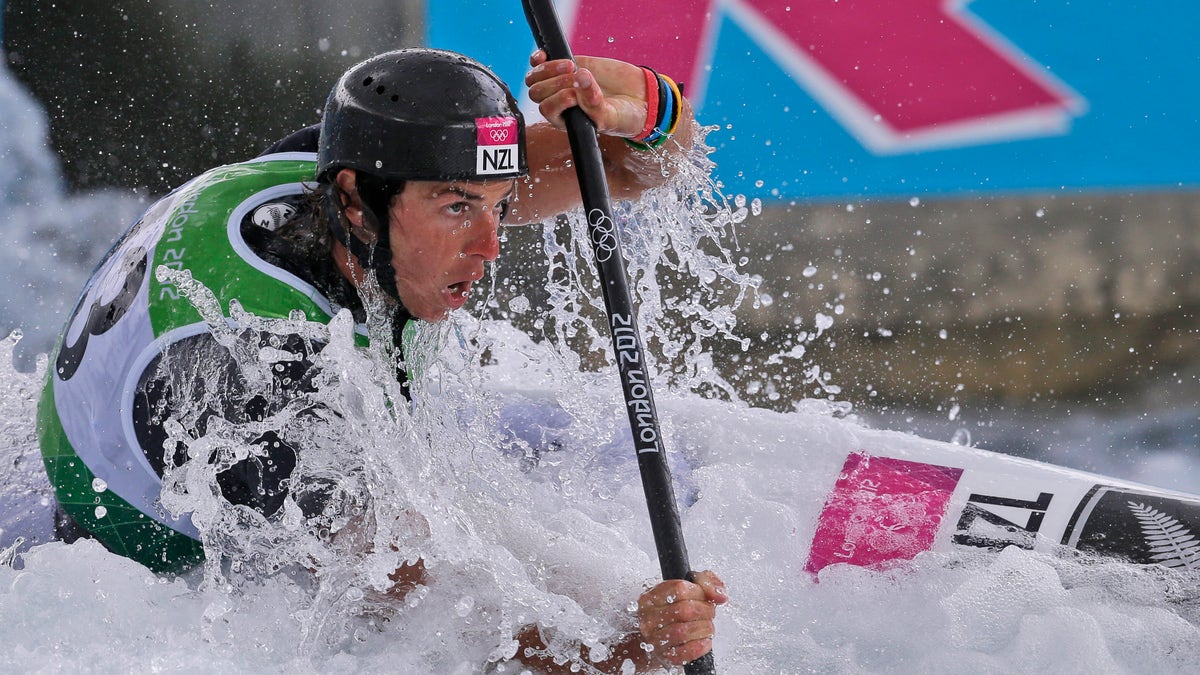
July 29, 2012: New Zealand's Mike Dawson competes in the men's K-1 kayak slalom heats at the Lee Valley White Water Center at the 2012 Summer Olympics. (AP)
Olympic fever is all about, and the world is watching swimmers, gymnasts, fencing experts and a myriad of athletes competing for the most coveted honors in the entire world of sports. The Olympic village is packed with thousands of athletes from all over the globe, and an entire temporary society has sprung up in and around London. As with all groups, the Olympic athletes have many needs. Here are some of them.
Water is first on the list. Proper hydration is an athlete’s friend, and inadequate hydration can be his or her downfall. One of the primary ways that we eliminate water is through perspiration – and the athletes in London are definitely sweating. They are engaged in highly strenuous activity, and they are losing water. Drinking fresh, pure water – hopefully not from plastic bottles but from filters – is high on the health priority list.
The electrolytes sodium, potassium, chloride and bicarbonate are needed by the body for the conduction of electricity. Electrical conduction is essential for proper nerve function, healthy enzyme activity, brain function and many other aspects of human life. Many athletes turn to artificially-colored electrolyte drinks, which are categorically unhealthy. It’s better to turn to cleaner electrolyte products, such as the famous Emergen-C packets. The Olympic athletes excrete electrolytes at a high rate, due to immense exertion, so they need to replenish their electrolytes every day.
Foods rich in antioxidants are high on the essentials list for the Olympians. These foods include all dark, leafy greens, and all red, yellow, blue, purple and orange fruits and vegetables. Antioxidants are needed to protect cells from premature damage due to exposure to free radicals. One of the primary causes of free radicals is intense exercise. So the athletes will be smart to do what Grandma always said: Eat fresh fruits and vegetables every day. Freshly made juices of colored fruits and vegetables provide a whopping load of protective antioxidants, so hopefully they have juicers in the cafeteria.
Intense athletic activity often leads to muscle soreness, which is where arnica cream or gel (like those sold by Boiron) comes in handy. Arnica Montana is a widely known and very well established plant that relieves muscle soreness and helps to reduce or eliminate bruising. You can find arnica cream and gel in natural product stores. Hopefully the Olympians packed some in their suitcases.
Joint pain is another typical outcome of intense athletic activity. For this, either a turmeric-based supplement (like Curamin by EuroPharma) or a cat’s claw supplement (such as the Nature’s Way standardized cat’s claw extract capsules) can relieve pain in about half an hour, and help athletes get to their next events with little or no discomfort. These remedies beat the common non-steroidal anti-inflammatory drugs (NSAIDs) which can cause irreversible kidney and liver damage.
Sleep is something the Olympians need in super-abundance. Sleep not only provides the body with much needed rest, but it allows the body to repair end regenerate. Olympians need cellular regeneration for all the tough activity. They would be smart to wait to party until after their last events.
Remember that most of the Olympic athletes are in their 20s and are laden with testosterone. Testosterone not only keeps them in good supply of lean body muscle; it also keeps their sexual arousal level very high. For this reason, a good and abundant supply of condoms is strongly advised. There will be plenty of sexual activity amongst the athletes in Olympic village. Better that all the sex is conducted safely.
The Olympics bring the global community together in a wonderful way. People who have dedicated huge portions of their lives to their particular sport compete with each other for high honors. For the rest of us, the Olympics provide a spectacle of unsurpassed performance, agility and excellence.
Chris Kilham is a medicine hunter who researches natural remedies all over the world, from the Amazon to Siberia. He teaches ethnobotany at the University of Massachusetts Amherst, where he is Explorer In Residence. Chris advises herbal, cosmetic and pharmaceutical companies and is a regular guest on radio and TV programs worldwide. His field research is largely sponsored by Naturex of Avignon, France. Read more at www.MedicineHunter.com








































